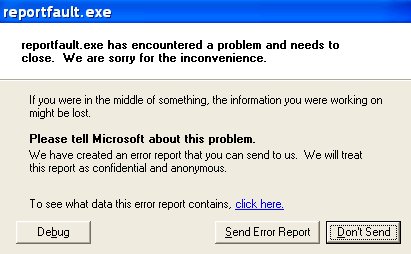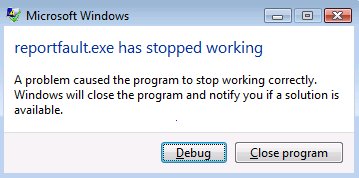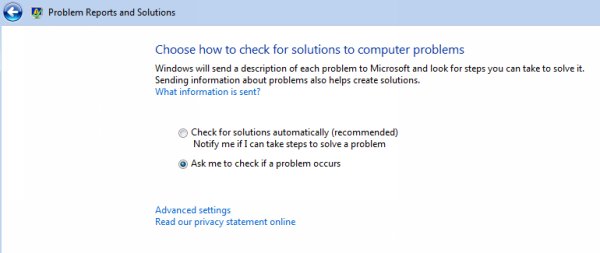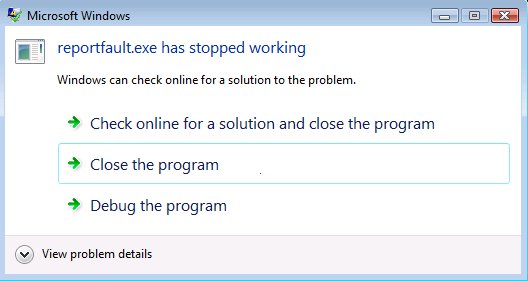The end is nigh (for my process) (16 Jun 2007)
How can you tell that you're the control freak type of Windows programmer? Easy: You feel that irresistible urge to install top-level exception handlers which report application crashes to the end user and provide useful options on how to proceed, such as to report the issue to the software vendor, save the currently loaded data, inspect the issue in more detail, or call the police. In fact, this is pretty much what
Windows Error Reporting
is all about, only that the crash reports are sent to Microsoft
first (to their Winqual site, that is), from where
ISVs can then download them for further analysis. Oh, and the other difference is that
Microsoft dropped the "call the police" feature in order to get Vista done in time.
One of the applications that I'm working on already had its own top-level crash handler
which performed some of the services also provided by Windows Error Reporting. It
was about time to investigate Microsoft's offerings in this area and see how they
can replace or augment the existing crash handler code.
The first option I looked at was the ReportFault
API. Microsoft's documentation says that the function is obsolete, and we should rather use a different
set of APIs collectively called the "WER functions". However, understanding them requires a lot more
brain calories than the trivial
In fact, this is pretty much what
Windows Error Reporting
is all about, only that the crash reports are sent to Microsoft
first (to their Winqual site, that is), from where
ISVs can then download them for further analysis. Oh, and the other difference is that
Microsoft dropped the "call the police" feature in order to get Vista done in time.
One of the applications that I'm working on already had its own top-level crash handler
which performed some of the services also provided by Windows Error Reporting. It
was about time to investigate Microsoft's offerings in this area and see how they
can replace or augment the existing crash handler code.
The first option I looked at was the ReportFault
API. Microsoft's documentation says that the function is obsolete, and we should rather use a different
set of APIs collectively called the "WER functions". However, understanding them requires a lot more
brain calories than the trivial ReportFault call which you can simply drop into an
exception filter,
and you're done.
The required code is pretty trivial and looks roughly like this:
int filter_exception(EXCEPTION_POINTERS *exc_ptr)
{
EFaultRepRetVal repret = ReportFault(exc_ptr, 0);
switch (repret)
{
// decode return value...
//
}
return EXCEPTION_EXECUTE_HANDLER;
}
void main(void)
{
__try {
int *foo = (int *)0;
*foo = 42;
} __except(filter_exception(GetExceptionInformation())) {
_tprintf(__T("Nothing to see here, move on, process is still alive!\n"));
}
Sleep(5000);
}
Sequence of events:
- A structured exception block is established using
__tryand__except. - Code provokes an access violation.
- The exception filter
filter_exceptionis consulted by the exception handling infrastructure to find out how to proceed with the exception. - The filter calls
ReportFaultto display the crash dialog as shown above, and to give the user options to debug the problem, ignore it, or report it to Microsoft. - After performing its menial reporting duties, the exception filter
returns
EXCEPTION_EXECUTE_HANDLERto indicate that its associated exception handler should be called.
_tprintf statement
which spreads the good news about the process still being alive.
 On XP, that is. On Vista, the
On XP, that is. On Vista, the _tprintf statement may actually never execute.
You'll still get a nice reporting dialog, such as the one in the screenshot
to the right, but when you click the "Close program" button, the calling process
will be terminated immediately, i.e. ReportFault never really
returns to the caller!
I debugged into ReportFault on my Vista machine and found that ReportFault
spawns off a process called wermgr.exe which performs the actual work.
My current hypothesis is that it is wermgr.exe which terminates
the calling process if the user chooses "Close program".
If you want to try it yourself, click here
to download the demo code. To compile, simply run it through cl.exe:
cl.exe reportfault.cppNow, can we complain about this, really? After all, you can't call it surprising if a program closes after hitting the "Close program" button. Still, the behavior differs from the old XP dialog - and it is inconsistent even on Vista. What I just described is the behavior that I found with the default error reporting settings in Vista. By default, Vista "checks for solutions automatically" and doesn't ask the user what to do when a crash occurs. This can be configured in the "Problem Reports and Solutions" control panel:

After changing the report settings as shown above ("Ask me") and then running the test application again, the error reporting dialog looks like this:

When I click on "Close program" now, guess what happens - the process does not terminate, and the
_tprintf statement in my exception handler is executed, just like on XP!
So that "Close program" button can mean two different things on Vista...
It's not just this inconsistency which bugged me. I also don't like the idea of
letting the error reporting dialog pull the rug from under my feet. Sure, I'd like to
use the dialog's services, but when it returns, I want to make my own decisions
about how to proceed. For example, I could try and save the currently loaded data
in my application, or I could add my own special reporting. Or call the cops.
ReportFault won't let me do that on Vista. And so I set out to
burn those extra brain calories anyway and learn about the new WER APIs
which were introduced with Windows Vista.
And burn calories I did, oh yes. More on this hopefully soon.
Attachment  | Action | Size | Date | Who | Comment |
|---|---|---|---|---|---|
| | manage | 4.1 K | 16 Jun 2007 - 14:49 | ClausBrod | Demo code using ReportFault() |
Revision: r1.2 - 17 Jun 2007 - 08:27 - ClausBrod